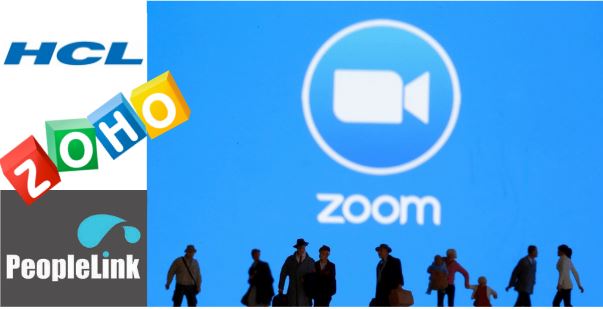The government of India has shortlisted ten companies including tech giant HCL technologies, homegrown cloud services firm Zoho, PeopleLink, Aria Telecom, CyberHorizon Corp, Darsh, and Instrive Softlabs amongst others to develop a made-in-India video conferencing (VC) solution in India. The move is aimed to develop a secure VC platform that can be used by the natives of the country without any fear of their data going overseas.
After the coronavirus pandemic turned people’s lives upside down, major companies, businesses, and schools shifted their work to the online platforms—particularly video conferencing applications became a pivotal part.
Therefore, these companies are expected to develop a prototype for the solution that will aim to be at par with global products such as Google Hangouts, and Microsoft Teams. These companies will be given a grant of Rs 5 lakh each to build the prototype, according to a report by ET.
After testing the prototypes in the initial round, the government will round up three out of these ten companies and they will be asked to build the complete solution. Additionally, they will be given Rs. 20 lakh each. The winning one will get to deploy the solution for the central and state government.
In the third and final round—the best VC solution will get a contract to deploy it for use by GoI and state government entities for a period of four years and will also be given Rs 1 crore in the first year and an additional Rs 10 lakh per year for three years after the first year for operations and maintenance of the solution for the government.
The project was launched last month by the government and is being undertaken by the IT Ministry. With the emphasis on developing the app indigenously, the government is looking to promote Indian software products.
One of the pre-cursor given to the companies by the government is that the VC app should be able to function in low-bandwidth areas smoothly as the internet speeds are not uniform across the country.
The benefits of having a home-grown video conferencing tool are manifolds. All of the data can be hosted locally and the government might also feel comfortable using the platform security-wise as compared to those owned by data-hungry multinational companies.
The lockdown made ‘Zoom’—a silicon valley based video-conferencing company, one of the leading social media platforms across the globe. But as it grew in popularity, doubts regarding its privacy and safety policies grew too.
Zoom was found routing the user’s calls through China, even when it is a US-based company. The CEO Eric Yuan had accepted the allegation saying, ‘We admit that your calls were routed through China,’ The Chinese Communist Party (CCP) might have got its hands on Zoom’s user data too.
In a blog released by the company, Zoom also admitted to not using true end-to-end encryption model. The term “zoombombing” has also found prominence whilst using the video conferencing app. ‘Zoombombing’ is when uninvited strangers crash Zoom meetings with lewd, obscene, and at times explicit content.
Consequently, Zoom has already been banned in Taiwan by the government amidst rising concerns over the apps security features.
The lapses drove away customers that included the likes of Elon Musk, who has banned the use of Zoom for SpaceX and Tesla due to privacy concerns. New York City has directed its schools — a system with more than 1.1 million students — to move away from using Zoom as soon as possible.
The platform is riddled with numerous security issues due to which Zoom has paused all feature updates for 90 days. The app’s privacy policy gave it the right to utilize users’ data and also shared it with third-party marketers.
With so many damning reports coming out in the open regarding the application’s reliability, the government of India came up with the idea to develop a home-grown platform. The government has started right and hopefully a fully-functional, interactive app is developed by the end of this exercise.






























